|
Dr Mark Bussin, EXCO member of the South African Reward Association (SARA), says that powerful international trends are changing the governance and remuneration landscape significantly.
“These trends are ushering in a profound shift in how we think about governance and remuneration, and smart boards and executive teams need to understand their implications,” he says. “Many of them are developing trends, so companies will need to keep their eye on the ball, and develop flexible strategies to respond to a shifting set of variables.” Dr Bussin says that while there are multiple trends, the following are the most important as they represent key directional shifts: Institutions and regulators flex their muscles Underlying many of these trends is the indisputable fact that both institutional investors and regulators are getting much more specific about what they want from companies in which they are invested. In particular, advisors like Lewis Glass and Institutional Shareholder Services are gaining more influence as they provide advice to large clients, and their agendas are thus gaining traction. Key agenda items include ESG and human capital measurement. ESG becomes a board matter Environment, social and governance (ESG) reporting has become mandatory globally. “The move to include non-financial metrics is positive, as it supplements traditional backward-looking and quantitative financial metrics with a new set that are essentially forward looking and qualitative,” he argues. “However, measurement is much more difficult and there’s no real objective way of doing it yet.” Human capital reporting grows up Another move to a more qualitative approach sees traditional reporting based on figures relating to gender and race being complemented by a deeper look at how the company is managing its talent. “We’re looking beyond numbers-based affirmative action to consider things like dignity, respect and, above all, inclusivity,” Dr Bussin says. Pressure to simplify remuneration Variable remuneration frameworks designed to drive performance have become so complex that that it has become virtually impossible to establish what anyone really earns, and so benchmarking cannot be done. Focus on the vertical and horizontal pay gap continues to grow The vertical pay gap—the CEO’s salary compared to that of the lowest paid worker—seems less and less useful as a measure. The top jobs are becoming more and more complex, and so attracting higher wages, while the lowest remain static. “The vertical pay gap will continue to widen and, in any event, redistributing the CEO’s salary to workers would make absolutely no impact,” says Dr Bussin. “For that reason, companies are moving towards paying a living wage (rather a minimum wage) to all employees as a way to make a real impact on people’s lives.” The horizontal pay gap—also known as the gender pay gap—remains a highly controversial issue. The global average is in the region of 25% whereas in South Africa it falls into the 10%-20% range. While the issue is not as clear cut as it might seem—other factors such as genuine parity of the work done and differing work/life priorities play a role—this is something that is receiving more focus. Work-from-anywhere trend raises significant issues Remote working has been growing in popularity over the past decade or so, strengthened by the recent lockdowns. On the governance side, this work style will demand a move from input-based to outcome-based performance management. Getting this right will surely only be a matter of time, but the tax question is more vexing: to whom would a consultant living in country A and working for multiple clients in various other jurisdictions pay tax? No firm answer to this question exists as yet. A related issue is the growing number of contractors, freelancers, part-timers and consultants: what kind and level of benefits are they entitled to receive? If the answer is none, then should they not be paid a premium? ENDS MEDIA CONTACT: Rosa-Mari Le Roux, [email protected], 060 995 6277, www.atthatpoint.co.za For more information on SARA please visit: Website: www.sara.co.za Twitter: @SA_reward LinkedIn: South African Reward Association Facebook: SARA – South African Reward Association
0 Comments
The litany of serious governance failures laid bare in the published elements of the Zondo Report is a wake-up for South Africa, and remuneration issues are at the heart of the problem—and it’s solution, argues Dr Mark Bussin, Executive Committee Member of the South African Reward Association (SARA).
“In many instances, inappropriate remuneration is the coalface of corruption and incompetence in our state-owned enterprises (SOEs) because, after all, it boils down to money,” he says. “If we sort out remuneration, we are half way to putting our SOEs back on the path for growth, with tremendous knock-on benefits for the economy as a whole.” A major contributor to the problem comes from the way in which Ministers often appoint CEOs directly. Best practice as recommended in King IV’s Supplement on SOEs advises that Ministers only appoint CEOs from a shortlist compiled by the board. Bypassing the board reduces it—and its committees, including the remuneration committee—to a mere rubber stamp. A CEO that is appointed directly by the Minister is in a position to instruct the remuneration committee to approve unjustified and excessive pay hikes and bonuses as has been done in numerous SOEs. Another key issue that emerges from the Zondo Reports is the negative impact of cadre deployment. With political connections counting more than competence or ethics in many of these deployments, many remuneration-committee members are incompetent even if they are not actively corrupt. This means they cannot properly interrogate remuneration benchmark studies and ask the right kind of searching questions. “In fact, these incompetent but politically connected individuals can easily be led to a foregone conclusion,” he says. Dr Bussin believes that too many board members rely on their emoluments from a single board, inclining them to adopting a passive role when it comes to controversial issues, such as the perennially vexed question of executive pay. To preserve their independence, non-executive directors should not be allowed to earn more than 20% of their income from one company, he says. “The real culprit here is cadre deployment which simply loads overheads onto companies for scant benefit. One way to attack this problem would be simply to do away with individual SOE remuneration committees, and institute a central one under the auspices of National Treasury,” he says. A similar approach was evident in President Ramaphosa’s 2022 State of the Nation, which indicated that moves were afoot to implement a centralised shareholder model for SOEs to improve governance. Many commentators pointed out that in essence the plan suggests that the only way to bring the sector under control is to impose governance from above. A centralised remuneration committee would immediately eliminate the need for hundreds of expensive board posts—a quick win for cash-strapped SOEs. “More important still, this approach would re-establish the link between remuneration and executive performance and value delivered to the company. It would also make being a deployed cadre much less attractive to incompetent and corrupt individuals,” Dr Bussin concludes. “Centralising remuneration could be accomplished easily and the payoffs would be large and immediate.” ENDS MEDIA CONTACT: Rosa-Mari Le Roux, [email protected], 060 995 6277, www.atthatpoint.co.za For more information on SARA please visit: Website: www.sara.co.za Twitter: @SA_reward LinkedIn: South African Reward Association Facebook: SARA – South African Reward Association The Draft Companies Amendment Bill (the Bill), 2021, has been published by the Minister of Trade, Industry and Competition for public comment.
“One objective of the Bill is to make it easier to do business in South Africa, but its onerous remuneration disclosure requirements could turn foreign companies away,” says Laurence Grubb, Master Reward Specialist and executive committee member at the South African Reward Association (SARA). While the Association endorses fair remuneration practices, especially at the executive level, Grubb questions the timing and rationale of the proposed amendments. What is fair? The reasoning behind the proposed changes to the Bill is that they will help tackle the perceived injustice of excessive pay that has contributed to the country’s inequality. Yet, the Bill offers no indication of what is meant by “excessive”, and the use of the word in the introduction is emotive and creates the impression that this is a widespread common problem. Excessive is not defined, is a subjective term and therefore it is difficult to know what excessive pay is and who is paid excessively. Shareholder empowerment The one positive aspect of the Bill is that rather than using laws to cap executive pay, it advocates increased disclosure and the response of shareholders. Public companies and SOEs will be compelled to publish details of the gap between the top 5 percent highest-paid and bottom 5 percent lowest-paid employees. This is contrary to previous proposals to use the Palma ratio, i.e. the top 10 percent versus the bottom 40 percent, which is statistically considered to be a more reliable measure. These figures will be exposed to shareholders when they vote for or against the executive remuneration policy and implementation report at the organisation’s AGM. Without a 50 percent approval on these votes, proposed to be ordinary and binding resolutions, neither can be implemented. Moreover, if the policy is not approved and cannot be implemented, this means a delay until approval is obtained from the shareholders. Who is to be held to account if an excellent CEO leaves because the share scheme was not approved and hence no shares can be awarded? The implications for a ‘no’ vote on the implementation report are even more onerous. The entire remuneration committee (Remco) must step down. Does this mean from the Remco or the Board? The shareholders do not vote on the Remco appointments. Rather, the Board appoints the Remco members. Nothing is said about what must happen next. Does the company continue until the next AGM without a Remco? Can the removed members be re-elected? Must the Board appoint a new Remco from its remaining members? What happens if the Chair of the Board is a member of the Remco – when the Remo steps down it not only leaves the Board without a Chairman but also leaves other Committees without members which may cause problems in terms of being quorate. The implications for shareholders may scare them from voting against either resolution because of the consequences. Either way, it makes for uncertain, dangerous, high risk resolutions which may make companies wary of proposing changes and certainly cannot be seen as investor friendly. Consequences The effect of these and other disclosure requirements set forth in the Bill may dissuade foreign companies from investing or remaining on our shores and cause local businesses to seek alternative measures. “The government needs to realise that companies are not compelled to do business in South Africa,” warns Grubb. Rather, they may choose to relocate their head offices abroad where their executives are not affected by the new legislation. They may also reduce or outsource their lowest-earning staff to shrink the pay gap. Worse, they could simply seek out more favourable regions where it really is easier to do business and bypass South Africa altogether. “The real tragedy is that the greatest inequality is the gap between the country’s employed and unemployed, so we need to focus on improved education and job creation instead of witch-hunting that will ultimately harm the economy,” concludes Grubb. ENDS MEDIA CONTACT: Rosa-Mari Le Roux, 060 995 6277, [email protected], www.atthatpoint.co.za For more information on SARA please visit: Website: www.sara.co.za Twitter: @SA_reward LinkedIn: South African Reward Association Facebook: SARA – South African Reward Association Whether or not executives earn too much and, if so, how to address executive remuneration practices, are two questions that continue to nag at global society.
“The pressure is even greater in South Africa, where inequality, poverty and unemployment are more pronounced,” says Martin Hopkins, Master Reward Specialist and past president of the South African Reward Association (SARA). The King IV Report on Corporate GovernanceTM recommends several approaches to governing executive reward. One is to give investors a greater say through remuneration voting. But what is it and what material effect does such a vote offer? What remuneration voting means King IV calls for executive remuneration in each company to be disclosed to investors through a remuneration report that has three parts: a background statement, an overview of the remuneration policy, and an implementation report. Further, shareholders are given the opportunity to pass a separate non-binding advisory vote on the policy and the implementation report. If 25% or more of the voting rights exercised by shareholders are against the remuneration policy or the implementation report, or both, the remuneration policy should specify the measures committed to by the board to respond to this voting outcome. These measures should include investor engagement and addressing objections and concerns, although King IV does not specify what format they should take or how they should be implemented. King IV is not enforceable by law; it is simply presented as a framework for good corporate governance. However, its influence is “given teeth” when its recommendations are adopted by regulators with the power to enforce them. This is true of the Johannesburg Stock Exchange (JSE) Listing Requirements, which makes certain of its practices mandatory for publicly traded companies. So, within the JSE's purview, remuneration voting is compulsory, not optional. Even so, a non-binding advisory vote by shareholders has no legal effect on the adoption of the remuneration policy or the implementation report. It simply allows the organisation's management and remuneration committee to gauge sentiment towards their provisions. That said, the vote serves as a powerful barometer of the company’s governance quality and of investor confidence. Should shareholders have more power? The effect of giving shareholders more say in how much executives earn is widely debated. They have a strong economic interest in good governance as well as a moral obligation towards equitable pay. At the same time, giving investors too much power may unduly affect the ability of the Board to govern and management to operate the company effectively. Investor activism can be a powerful force for good, but ultimately the directors need to balance the needs of many stakeholders and make balanced decisions that are overly influenced by any single voice. Measures to provide for increased shareholder power are currently being debated by various interest groups, with measures such as a binding vote on the remuneration policy and/or the implementation report and the so-called “two strike” rule being considered. The binding vote means that the directors must adhere to the provisions of the approved policy and may not apply their discretion to vary the policy terms without shareholder approval. The “two-strike” rule would mean that in the case of two successive votes of more than 25% against the remuneration policy or implementation report the members of the Remuneration Committee would have to step down from the committee for at least two years, and be replaced by other members of the Board. There is diverse practice on remuneration voting in developed and developing countries, with a binding vote on the remuneration policy at a 50% threshold in place in the UK, which is viewed as being reasonably effective, and non-binding voting practices in the US and Canada. Australia has adopted the “two-strike rule” with limited success. Reward perspective Hopkins notes that while there is a great deal of emotion regarding executive pay it's also important to recognise that it is not at all clear that executive pay can be dramatically reduced without damage to the ability of business to generate shareholder value and create jobs. Market forces mean that any one company within a country can’t dramatically reduce executive pay without immediate loss of skills and leadership. If regulations in a country systemically reduce all executive pay then mobile highly skilled executives may well move to other countries which have no such regulations. Many companies aspire to pay their executives in line with their contribution to business profitability and reward them against agreed performance milestones. King IV was developed to reign in excessive remuneration practices, not prevent companies from fairly rewarding employees for their contribution and performance. “Organisations should also look at the other end of the pay fairness equation, with increasing focus on the pay gap and how this should be measured and addressed”, says Hopkins. Together with caution in respect of executive pay, measures to increase the pay of the lowest paid staff, whilst remaining economically competitive is another important reward factor to consider. “This is a complex issue”, concludes Hopkins. Business leadership cannot disregard calls from many quarters to address these issues, but must also seek to balance the views of multiple stakeholders with the pressing need for economic growth and job creation. ENDS MEDIA CONTACT: Rosa-Mari Le Roux, 060 995 6277, [email protected], www.atthatpoint.co.za For more information on SARA please visit: Website: www.sara.co.za Twitter: @SA_reward LinkedIn: South African Reward Association Facebook: SARA – South African Reward Association Recent reports of shareholders voting against executive remuneration structures have again highlighted the need for increased transparency in the disclosure of not only the amounts paid, but how the amounts were calculated and the link to performance. Many companies have made significant progress with the disclosure of executive pay and the quality and content of remuneration policies and implementation reports.
However, the improved transparency of certain excessive executive pay packages has also fuelled the perception that all executives are paid exorbitant amounts of money, causing an ever increasing pay gap. Laurence Grubb, Master Reward Specialist and executive committee member of the South African Reward Association (SARA), says a handful of executives are still able to manipulate remuneration committees, despite notable efforts to follow the principles set out in King IV and the association’s guidelines. Committees agree to targets which are a little too soft or potential remuneration that is out of line with industry. “Although these executives are in the minority, it remains a concern and needs to be contained.” Independent advice needed Grubb says remuneration committees should be entitled to obtain independent advice from their own remuneration consultants to validate what has been presented to them by the executives. The cost for this service should be borne by the company. SARA published guidelines on the drafting of a remuneration policy and the implementation report at the beginning of the year which follows the principles set out in King IV. Some ‘old’ long term incentive schemes may have awards which were not linked to performance. Those shares may now be vesting, and with no performance linked to them, it is quite possible that shareholders will vote against such schemes. Grubb says companies need to confirm the performance criteria for vesting before making any awards for long term incentives. Failing to do so, will undoubtedly annoy shareholders. Barclays Africa experienced this first hand when shareholders voted against the company’s policy and implementation report earlier this month (May 2018). In terms of the King IV principle on remuneration, the policy should record the measures that the board commits to when 25% of the votes are exercised against either the remuneration policy or the implementation report, or both. These actions should then be communicated in the background statement in the following year. South Africa is the only country in which the threshold for these remedial measures is as low as 25%. In Australia, the UK and Belgium, among others, remedial measures are only mandated if 50% or more of the votes are cast against the remuneration policy and implementation report. Pay gap realities The pay gap in South Africa remains a burning issue, although companies have been trying to address it by offering larger annual increases for lower level workers and smaller increases at executive level. However, an increase of 5% on R2 million will always make a bigger gap than 8% on R100, 000. Several companies have also introduced the minimum wage, and in some instances, wages which exceed the minimum wage. In countries where the pay gap is much narrower, the level of skills, education and productivity of the lower end workers are much higher than in South Africa. Grubb says companies operating in those countries are typically able to pay much higher rates to their lower level employees because of the higher skills and productivity levels. “Unfortunately, in countries where education is severally limited and not at the right standard, the impact is felt mostly by those whose skills and level of education do not offer them the opportunity to increase their earning potential.” Companies find it difficult to continually pay higher salaries to lower levels and, inevitably where that does happen, there are job losses.  Recent reports have highlighted the disparity in remuneration between CEOs and workers. Consequently, many commentators have questioned the fairness of executive packages, calling for greater regulation of those salaries and benefits. According to Dr Mark Bussin, Executive Committee Member of the South African Reward Association (SARA), this is a problem domain ideally suited to the Reward Specialist. “First,” says Dr Bussin, “one must understand how remuneration is determined at various levels.” General workers For general workers, a fair wage is decided through collective bargaining, striking a balance between what employers can afford and trade union negotiators are willing to accept. “It’s notable that recent increases have been in the 7% to 8% range - higher than CEOs,” reports Dr Bussin. “Companies, aware of the pay gap, it seems, are trying to close it.” Salaried staff For salaried staff, various factors are considered, including salary surveys, inflation, education, personal performance, and the scarcity of an employee’s skills. “Ultimately,” says Dr Bussin, “the finance department budgets for an overall payroll increase in line with inflation, currently around 6%.” CEOs and directors Executive salaries are more complex. Dr Bussin explains that CEOs and directors face much higher pressure than other employees. “Their track record for leading companies successfully in the face of overwhelming personal risk is why they’re engaged. As such, they command commensurate reward.” They’re usually compensated in two ways. Fixed pay Executive officers get a fixed salary that is mainly determined by benchmarking. This includes salary surveys and comparative studies of companies of similar size and complexity. Their pay in relation to these measurements will depend on the organisation’s remuneration policies. Variable pay Executive officers also receive short-term and long-term incentives. Short-term incentives are based on performance targets that, if achieved, usually result in a reward of between 50% to 100% of fixed annual salary. Long-term incentives, linked to company performance, are full shares and share appreciation - the value of the increase in share price. Pay discrepancies However, an ill-conceived remuneration package can reward even an underperforming executive officer. “These are the cases we see highlighted in the media,” observes Dr Bussin. “The perception that executives are overpaid is then generalised when, most often, their salaries are carefully formulated against industry norms.” Real or imagined, companies want to avoid any notion of biased remuneration. Dr Bussin says the King IV Report offers greater transparency by requiring executive remuneration reporting as a single total figure. “Businesses can leverage this opportunity to show that their executive officers are indeed compensated fairly.” The Reward Specialist A Reward Specialist should be engaged to ensure executive pay does not overstep the boundaries of sanity. At times, shareholders or the board may be desperate to turn a company’s fortunes around, making them bullish about a maverick hire. Here, the Reward Specialist offers an impartial perspective based on in-depth analysis. “Lastly,” concludes Dr Bussin, “Reward Specialists can create a communication plan that educates employees, shareholders and the public on company remuneration policies and executive compensation, avoiding both the reality and perception of their executives being overpaid.” ENDS MEDIA CONTACT: Carla Coetzee, [email protected], www.atthatpoint.co.za For more information on SARA please visit: Website: www.sara.co.za Twitter: @SA_reward LinkedIn: South African Reward Association Facebook: SARA – South African Reward Association Executive’s pay has come under scrutiny after a report titled ‘Shareholder Alignment, Company Performance and Executive Pay’ was released by Deloitte earlier this week. Addressing inequality is an important national imperative and we support it wholeheartedly. Unemployment is at unacceptably high levels and as a nation, we need to do everything possible to create jobs. However, it is necessary to contextualise executive pay.
When reporting on executive pay increases, it is important to consider one executive at a time. Using this approach, we believe that executive remuneration increases have been on par and in most instances lower than the general workforce. Organisations have adopted this approach in an attempt to close the wage gap. If the Top 100 CEO’s or CFO’s remuneration is considered as a group, the increase in the remuneration will be impacted on by CEO’s and CFO’s who have left and the new ones appointed often at premiums to “buy” them. This is also true for public service and public office bearers who have over the past several years taken smaller pay increases than lower level workers in order to address the pay gap ratio. The allegation that executive pay is misaligned with performance is not true, even based on the author’s own research. Total Annual Cash growth and shareholder value growth is in our view closely aligned over the period. It is not aligned with HEPS growth, but that is due to the economic downturn in the final year which is reflected immediately in HEPS. What is even more compelling is the Total Remuneration of executives (including LTI’s), which is the most holistic measure of actual pay, has gone up much less than the investment returns. This allegation is thus wrong even on their own data and may be based on cherry picking measures. Strengthening the link and evidence between organisation, individual executive performance and executive pay is high on the agenda of most Remuneration Committees. When analysing and substantiating this link, several measures of organisational performance can be used. There are different views as to the most appropriate measures, and certain measures are more applicable in certain industries. In the South African Reward Association library, there are several research reports that take on average 8 organisation performance measures and correlate them to CEO contribution and remuneration. Generally, several measures correlate positively and one or two may not correlate. From this, one should not take the one or two that don’t correlate and conclude that there is no correlation between CEO performance, pay and organisation performance. Care needs to be taken to arrive at the correct conclusion between organisation performance and executive pay. We believe that the corporate governance processes in South Africa are, broadly speaking, working well. Arresting the pay gap ratio is something that we all need to work harder at. There are many ways to address this. Education is pivotal to this approach because higher skills leads to more skilled work, better productivity and better pay. Halving CEO pay will not address the problem. With the ever increasing regulatory and governance environment and increasing complexity of running a business, CEO’s are commanding higher salaries. This needs to be carefully balanced with the pay gap ratio. The gap between the unemployed and the lowest level worker is infinite. Unemployment is our biggest problem. Let’s not ignore the wage gap but more importantly make sure whatever we do does not result in more unemployed. Institutional investors also need to come to the party and resist demanding ever higher returns from CEO’s which in turn exacerbate the pay gap ratio. As a Nation, we all need to address this problem collectively, and responsible reporting is also part of this solution. SARA is a professional body aimed at promoting the reward profession and practices. While setting minimum standards for the industry, we award professional status to eligible members in various reward categories and create knowledge-building, sharing and networking opportunities for our members and those operating in our industry. We do this to promote and develop the reward industry and to ensure sound reward management practices and acceptable standards. As a professional body, we support strong and robust corporate governance, especially when it comes to remuneration. Strong media and shareholder activism goes a long way in supporting better governance and we are in support of both approaches to strengthen current codes of practice for example King IV, Sarbanes Oxley, Basel and Pillar frameworks and stock exchange requirements. ENDS MEDIA CONTACT: Carla Coetzee, 072 112 8347, [email protected], www.atthatpoint.co.za For more information on SARA please visit: Website: www.sara.co.za Twitter: @SA_reward LinkedIn: South African Reward Association Facebook: SARA – South African Reward Association  Dr Mark Bussin, Executive Committee Member of the South African Reward Association (SARA) Dr Mark Bussin, Executive Committee Member of the South African Reward Association (SARA) With South Africa Inc facing strong economic headwinds, both the private and public sectors must take a radical, creative approach to remuneration, says Dr Mark Bussin, Executive Committee Member of the South African Reward Association (SARA) and chairperson for 21st Century. “With economic growth officially in the 1 percent range, and closer to 0 percent in reality, employers and labour are going to have to face up to some tough decisions,” Dr Bussin says. “On the one hand, across-the-board increases are simply not sustainable but, on the other, the high performers in the company have to be rewarded and incentivised. In other words, our current way of thinking about wages has to change—and radically. Conditions are going to get tougher, at least for the next few years.” As a result, reward will have to be more tightly linked to performance in order to ensure that companies receive value and bloated wage bills do not threaten their long-term sustainability. Over the past several years, wage demands have borne no relation either to the company’s health, the economy or workers’ performance. This, Dr Bussin argues, is simply unsustainable. In addition, companies will have to have the freedom to selectively reward the employees who have contributed to their growth or whose skills are particularly in demand. At the same time, though, he readily accepts that those who are being paid less than a living wage—creating the unwelcome category of “in-work poverty”—need to be prioritised. However, this legitimate drive to pay workers a fair wage still has to be linked to performance. Achieving this will require an investment in training as well as focused management input. One way to pay for this special category of increases could be for highly paid executives to give up their automatic increases and bonuses. This would also be a powerful tool for building employee engagement and defusing some of the antagonism between management and labour that continues to hamstring commerce. The fact that the President and other members of the executive, members of Parliament, members of the provincial legislative, judges and others government leaders agreed not to receive increases in the 2016-17 financial year is a good example that the corporate world has signally failed to follow. “Similarly, in the public sector, we cannot go on granting automatic increases on demand. There, too, pay has to be linked to performance. Cutting the huge levels of fruitless and wasteful expenditure could actually be linked to pay-rises in the sector, giving everybody an incentive to curb this abuse,” Dr Bussin argues. “In general, all parties—labour, management and shareholders—need to accept that they are in the same boat. If the company, or the country, for that matter, goes down, then everybody goes down with it. Simply put, we all need to do things differently, to think differently. “This will require political will on the part of leaders, but there is no alternative,” he concludes. ENDS MEDIA CONTACT: Cathlen Fourie, 082 222 9198, [email protected], www.atthatpoint.co.za For more information on SARA please visit: Website: www.sara.co.za Twitter: @SA_reward LinkedIn: South African Reward Association Facebook: SARA – South African Reward Association  Government involvement in executive remuneration will have unintended consequences, says Laurence Grubb, Executive Committee Member at the South African Reward Association (SARA) and Managing Director at Khokhela Consulting. Executive pay is a perennial hot topic in today’s media, particularly in the context of growing inequality. Unsurprisingly, it has found its way into governance codes like the King Report. There is even talk of governments getting involved in regulating executive pay, presumably in the interests of social cohesion. Whatever the reason, government involvement in what is a private, corporate matter should be vigorously resisted; shareholders have invested their money in a company and it is they who should be controlling how its executives are rewarded, and thus incentivised to perform. In cases where governments have attempted to intervene they have backfired. In the wake of the 2008 financial crisis, the European Union imposed a cap on bonuses for bankers. Banks simply increased the guaranteed pay and/or created a new category of variable pay called an “allowance” rather than a “bonus”. This has negatively affected the desired link between performance and reward. Indeed, corporate governance codes and practices are leading to better solutions to the challenge. While they are perhaps not yet perfect—and may perhaps never be—considerable progress is being made as the business world builds up experience in this area. At the outset, it is perhaps worth noting that the common view that all executives are overpaid is simply not true. In fact, many remuneration committees are creating and implementing good remuneration policies which consider all stakeholders. Companies are in business to make a profit, so overpaying executives is hardly likely to appeal to them. So what are the current developments in corporate governance aimed at refining remuneration? And what are the issues? Perhaps the biggest trend—evident in King III and judging from the draft in the King IV™ Report on Corporate Governance for South Africa 2016 issued by the Institute of Directors Southern Africa—is the concept of a shareholder vote on both the remuneration policy and its implementation. There are many variations. In Australia, for example, if a corporate remuneration policy receives a lower-than-75-percent vote at three consecutive AGMs, the board is forced to resign. The most common pattern is for the remuneration policy to be subject to a vote at intervals (two- or three-year intervals are common), with the implementation of the policy the subject of an annual vote. Obviously, it is impossible for the implementation vote to be binding—in the very nature of things, employment contracts cannot be delayed until the AGM. However, the question of whether the vote on the remuneration policy should be binding or not remains moot. The King approach has been to make it non-binding, but to make it a requirement for companies to “engage with” those who voted against the policy. It might seem that a binding vote on the remuneration policy makes sense, but there is always the risk that a group of minority shareholders could use the vote to further another agenda by effectively expressing a lack of confidence in the board. It may also not necessarily be an effective way to curb excessive executive pay: Switzerland has such a binding vote on remuneration policy, but its CEOs are the best-paid in Europe. While we do not yet know what the final recommendations of the King IV™ Report, due to be released by the Institute of Directors in Southern Africa on 1 November 2016, will be, it seems certain that South Africa will remain loyal to the principle of a non-binding vote on remuneration policy, probably every two years, but with an obligation to deal with shareholder concerns. On balance, this seems sensible because it keeps the door open to a negotiated solution. To conclude though, one must highlight a potential issue when it comes to the effectiveness of shareholder voting on such important issues. This is that the bulk of shareholder votes are controlled by third parties, the huge institutions who invest on behalf of individuals. They are often short of resources that are required to analyse policy issues carefully, and they are also not directly concerned with the company in the way that the original type of shareholder was. The original link between the provider of the funds, the board as an agent for the funder and the executives has therefore stretched to the point where some creative thinking is required to bridge this gap. This caveat aside, governance standards built on consensus and best practice are most likely to yield results, while regulatory intervention will simply be counterproductive. ENDS MEDIA CONTACT: Cathlen Fourie, 082 222 9198, [email protected], www.atthatpoint.co.za For more information on SARA please visit: Website: www.sara.co.za Twitter: @SA_reward LinkedIn: South African Reward Association Facebook: SARA – South African Reward Association Remuneration policies and practices have created social division and even the breakdown in trust between companies and employees. Communication and education are key tools to bring clarity and, with it, lessen tensions.By Dr Mark Bussin Executive Committee Member, South African Reward Association (SARA)  For many, the huge disparities between the rewards assigned to executives and the wages paid to other employees are concrete evidence of a basic unfairness underpinning 21st century capitalism. Global outrage over executive packages that are perceived to be too high was one driver of the Occupy Wall Street and similar movements, and remuneration has become a hot topic at shareholder and board meetings. Given its past, this issue is one that is particularly toxic in the South African business world. It is an unfortunate legacy of apartheid that whites are over-represented among the ranks of senior corporate leadership. In this context, wage disparities take on a distinctly racial complexion, a fact that political parties and unions have been quick to exploit. Unhappiness about the wage gap between top and bottom earners is helping to create the unstable industrial relations that plague South African industry. Those who are worried have a point. In the United States, which has the highest wage gap, the average CEO earns 164.4 times what the median worker earns, according to 2014 research. The same research pegs South Africa at fifth in the world, with CEOs earning 73.1 times as much as the average worker. Of course, these ratios increase dramatically when CEO pay is compared with the lowest wages in the company. Responding to these concerns, and the negative effect of wage disparity on corporate sustainability, the draft of King IV recommends that boards should “consider and disclose the measures put in place to attain fair and responsible executive remuneration in the context of overall employee remuneration”. The key words here are “consider and disclose”, because it is clear that the perception that high wages are immoral can only be countered by communication and education—and here I think those companies that employ a reward professional would be well advised to use him or her. Part of the disconnect between workers and unions on the one hand, and bosses on the other, is that the principles of the company’s remuneration policy are not properly understood. This gap can only be bridged when these principles are effectively communicated in language that everybody can understand. Ready for scrutiny? However, it also has to be recognised that communication and education will only work if the remuneration policies are well-constructed and that there is constant oversight by the board to ascertain that they are, in fact, working as planned. This oversight must come from the board rather than the executive team. The board must also ensure that the company’s remuneration principles and practices are communicated to, and are understood by, all stakeholders. It goes without saying that boards will need to heed the comments and concerns expressed by stakeholders, and will have to accept that any weaknesses in their remuneration strategy will become matters of public record. One of the challenges they face is that linking pay to performance is extremely tricky to get right, and has led to many unintended consequences. The guiding principle here should be to ensure that the desired outcomes are achieved before the executive is rewarded, and that the risk to which an executive exposes the company in pursuit of the outcomes is factored into the remuneration. Integrating the risk profile into the remuneration strategy will require good judgement, and will have to include difficult-to-measure risks such as liquidity risk, reputation risk and cost of capital. Considering the wider context is also important, and the optics of remuneration packages needs to be right too. Whether or not companies have the services of a reward professional, the following best practices serve as a useful guide: Benchmark When benchmarking, compare executive guaranteed pay to organisations of similar size and complexity. Benchmarking provides a basis for comparison and provides some justification for the remuneration model chosen. Link pay to performance Executive variable pay should be linked directly to company performance and the executive’s ascertainable contribution to it. The right measures need to be found to ensure that executives are not rewarded for achieving results that, in the long term, could affect sustainability. Incentives for cutting costs could be achieved by reducing R&D or maintenance, with drastic long-term consequences, for example. Enhance stakeholder value It is imperative that stakeholder value is enhanced and remuneration is sustainable. In pursuit of incentives, executives can create projects that deliver once-off results. In today’s world, too, creating value for shareholders is not adequate to secure a company’s social licence to operate. Report remuneration in a way that is accessible to all stakeholders Remuneration is extremely complex; as King IV makes clear, companies have an obligation to disclose their remuneration policy in a way that is understandable by all stakeholders. Remuneration goes to the heart of corporate sustainability in all sorts of ways. Getting it right has never been harder—or more vital. ENDS MEDIA CONTACT: Cathlen Fourie, 012 644 2833, [email protected], www.atthatpoint.co.za For more information on SARA please visit: Website: www.sara.co.za Twitter: @SA_reward LinkedIn: South African Reward Association Facebook: SARA – South African Reward Association |
Archives
March 2023
Welcome to the South African Reward Association newsroom.
Categories
All
|

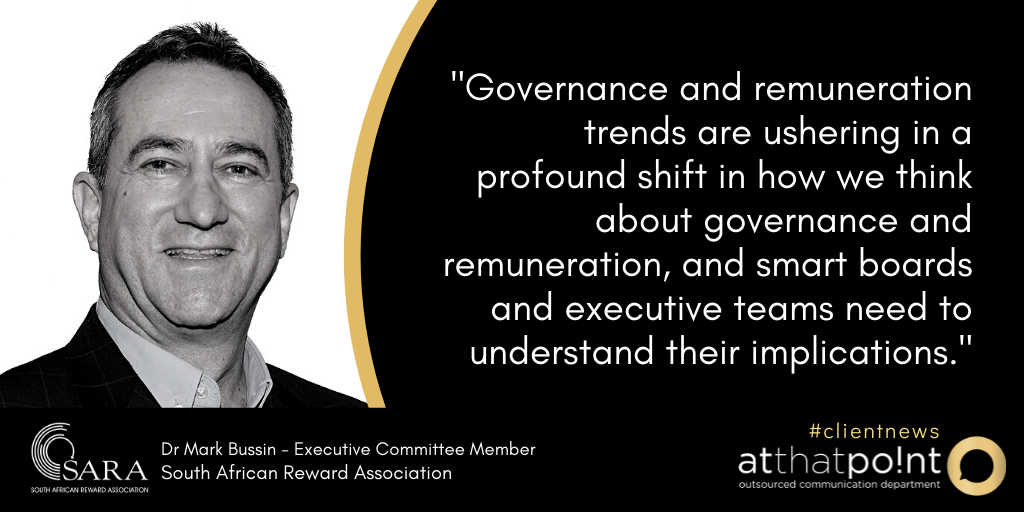
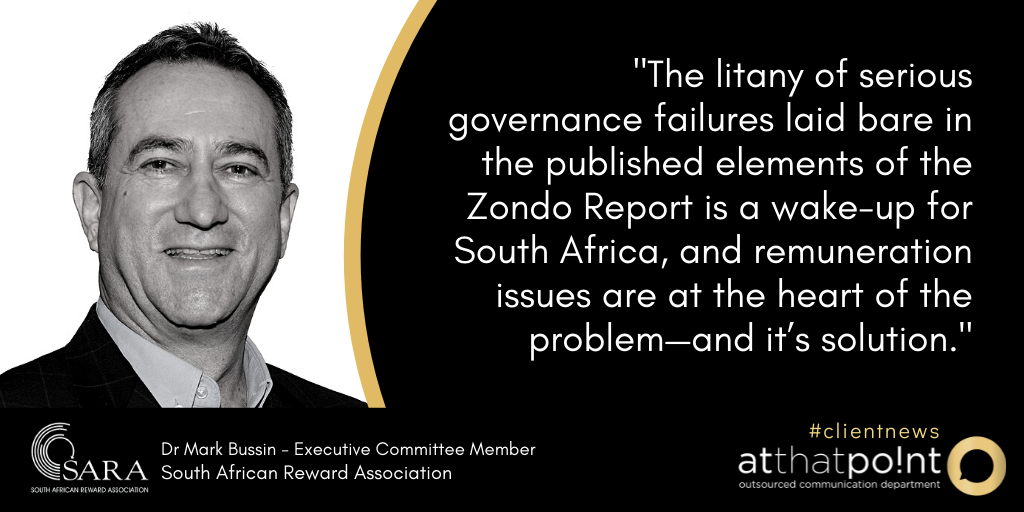
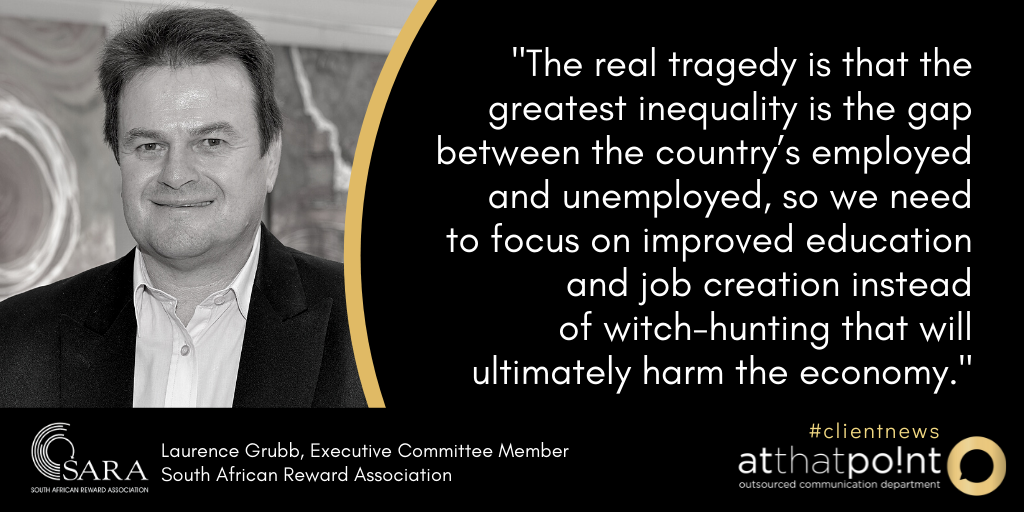
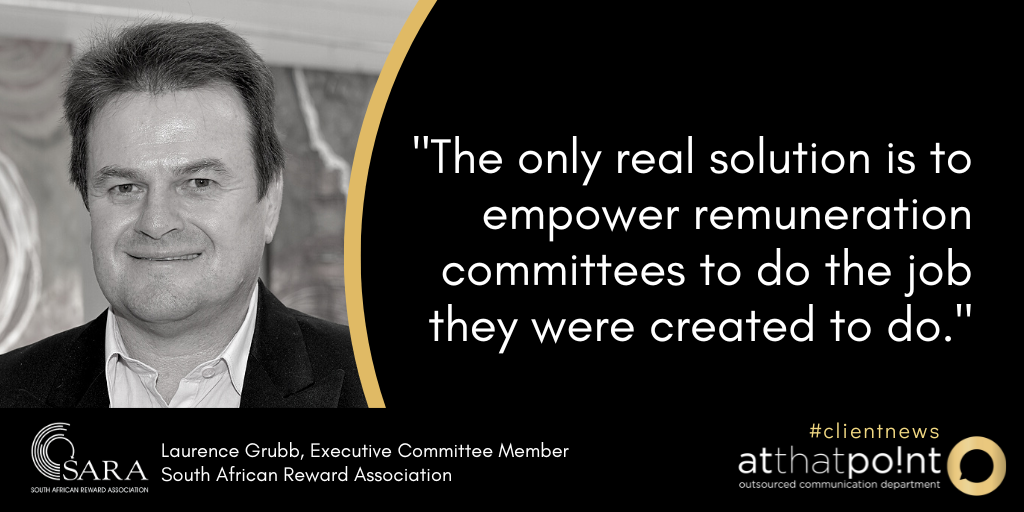
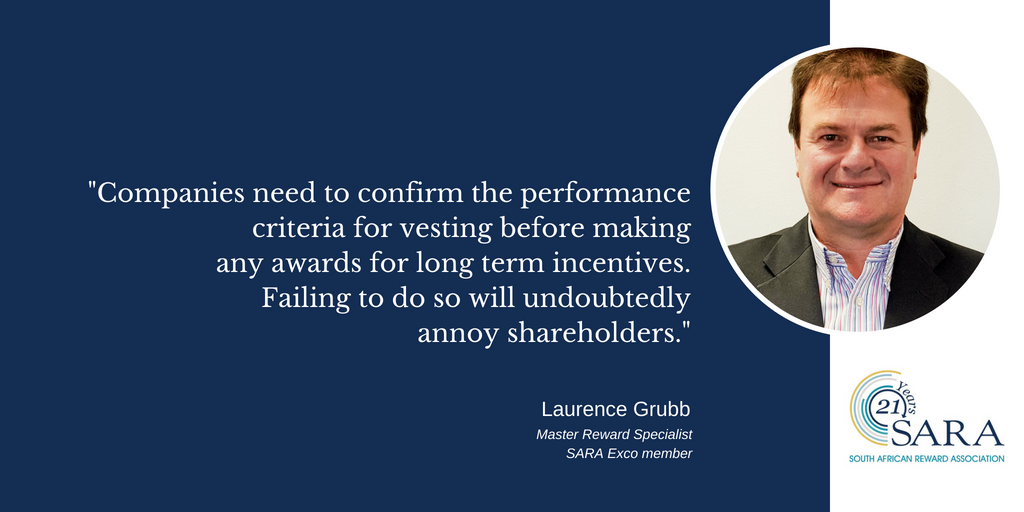
 RSS Feed
RSS Feed